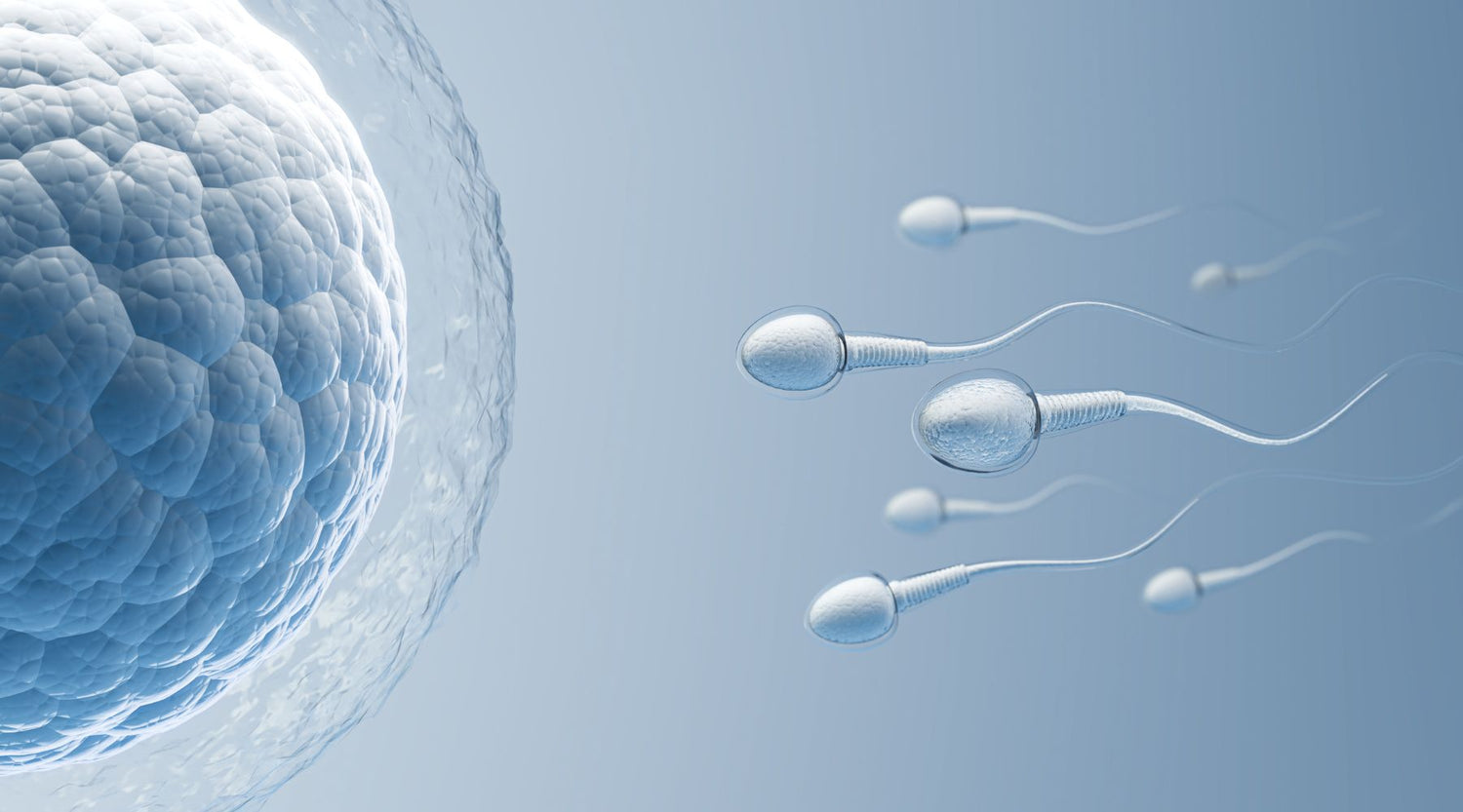Spermidine, a naturally-occurring polyamine, has recently garnered attention in the scientific community for its potential role in enhancing fertility. Found in all living cells and various foods such as wheat germ, soybeans, aged cheese, and mushrooms, spermidine is involved in crucial cellular processes including growth, proliferation, and autophagy [1]. As the average age of first-time parents continues to rise globally, understanding and potentially mitigating age-related fertility decline has become increasingly important. Here, we discuss the emerging research on spermidine's effects on both female and male fertility, highlighting its potential as a therapeutic agent in reproductive health.
Female Fertility and Spermidine
Female Reproductive Aging
Women are born with a finite number of oocytes (eggs), which decline in both quantity and quality with age. This natural process, known as ovarian reserve depletion, begins before birth and continues throughout a woman's reproductive lifespan.
At birth, a female has approximately 1-2 million eggs, which decreases to about 300,000-500,000 by puberty. By age 30, only about 12% of the original egg pool remains. This decline leads to reduced fertility, particularly after age 35, with a marked decrease by 37 and the onset of menopausal transition typically occurring between 45-50 years [2]. The rate of this decline in both quality and quantity is influenced by various factors, including genetics, environment, lifestyle choices, and the biological hallmarks of aging.
Metabolic Regulation and Egg Quality
As women age, not only does the quantity of eggs decrease, but their quality also diminishes [4]. A key determinant of female fertility is metabolic regulation, particularly mitochondrial function in eggs. Mitochondria provide the energy necessary for optimal egg quality during embryonic development, maturation, and fertilisation. They play a crucial role in cellular energy production, calcium regulation, and regulation of egg cell recycling. However, aging is associated with progressive mitochondrial dysfunction, primarily due to oxidative stress, which significantly impacts egg quality and fertility.
Spermidine's potential to influence cellular processes related to aging and metabolism has led scientists to investigate its effects on reproductive function. Recent studies have shed light on how this compound might address some of the key issues associated with egg aging, including mitochondrial dysfunction and oxidative stress. Let's delve into the fascinating research that explores spermidine's role in aging fertility.
Spermidine Levels and Egg Quality
Given the link between fertility and metabolism, the power of polyamines in supporting mitochondrial function is a promising avenue of exploration in the context of preserving fertility.
Autophagy and Mitophagy
Recently, exciting advancements were made by applying this theory, with a study published in Nature confirming that spermidine can rejuvenate egg quality through enhancing the removal of damaged mitochondria (via autophagy) [5]. This research group applied untargeted metabolomics, identifying spermidine as a critical metabolite in ovaries in protection of eggs against aging. Most notably, they found that spermidine levels were reduced in the ovaries of older mice and that supplementation with spermidine promoted:
- Follicle development
- Egg maturation
- Early embryonic development
- Overall improved female fertility of aged mice
Antioxidant Properties
Polyamines have been shown to possess significant antioxidant properties, which are crucial for protecting eggs from oxidative damage. It has been evidenced in research that spermine and spermidine can function directly as free radical scavengers, protecting cellular components from oxidative damage [6]. To this point, a recent study has found that spermidine supplementation in mice increased the activities of a number of antioxidant enzymes and total antioxidant capacity in ovarian tissue [7]. Furthermore, this study showed that spermidine significantly reduced malondialdehyde (MDA) content in ovarian tissue, indicating a decrease in lipid peroxidation.
Benefits for Female Fertility
Given that mitochondrial dysfunction and oxidative stress are major contributors to age-related decline in egg quality, spermidine's antioxidant and autophagy-inducing properties have significant implications for fertility. By reducing oxidative stress, spermidine may help preserve the integrity of egg DNA, proteins, and lipids, which are crucial for successful fertilisation and embryo development [8]. Through enhanced mitophagy, spermidine may help eliminate damaged mitochondria in eggs, potentially improving overall egg energy metabolism and quality.
Male Fertility and Spermidine
Male Reproductive Aging
Unlike women, men do not experience a complete cessation of fertility with age. However, male reproductive aging is characterised by a gradual decline in testicular function and sperm quality. This process typically begins around age 35-40, with more pronounced effects after 50 [9]. The decline is marked by decreased testosterone levels and reduced sperm production along with diminished sperm quality. This includes lower motility, decreased normal morphology, and increased DNA fragmentation [9]. These changes can lead to reduced fertility, longer time to conception, and increased risk of genetic abnormalities in offspring. The rate and extent of this decline vary among individuals and are influenced by factors such as genetics, lifestyle, environmental exposures, and overall health status.
Spermatogenesis and Testicular Function
A key determinant of male fertility is the continuous process of spermatogenesis, which relies on the proper function of Sertoli and Leydig cells in the testes. Sertoli cells provide structural and nutritional support to developing sperm cells, while Leydig cells produce testosterone, essential for sperm production and maturation. With age, there is a gradual decrease in Leydig cell numbers and function, leading to reduced testosterone production. This hormonal change, coupled with a decline in Sertoli cell efficiency, results in decreased sperm production and quality. Additionally, aging is associated with increased oxidative stress and DNA damage in sperm cells, which can impact fertilisation potential and embryo development.
Spermidine has shown promising effects on various aspects of sperm quality, including motility, viability, and morphology.
Spermidine and Sperm Quality
There has been some evidence from research that spermidine supplementation significantly improved sperm motility and overall health in animal models [10]. This improvement in motility is crucial, as it enhances the sperm's ability to navigate through the female reproductive tract and increases the chances of successful fertilisation. The positive effects of spermidine on sperm quality extend beyond motility, with research demonstrating spermidine's role in promoting normal sperm morphology and enhancing superoxide dismutase activity, which is essential for protecting sperm from oxidative damage [11]. Furthermore, studies have demonstrated that the addition of L-arginine (a polyamine precursor) to sperm samples from diabetic patients improved sperm motility [12].
Improved Testicular Function
Research has shown that spermidine supplementation can have beneficial effects on testicular function. A study in mice found that spermidine could rescue testicular dysfunction induced by triptolide (a compound known to impair male fertility) [13]. It increased the expression of genes related to spermatogenesis and improved offspring numbers. Additionally, spermidine has been found to play a role in guaranteeing that sperm perform their acrosomal reaction at the right time; a process which is essential for fertilisation [10]. This suggests that spermidine may be involved in regulating the complex processes of sperm capacitation and the acrosome reaction.
Antioxidant Properties
In parallel with female reproductive aging, oxidative stress is a significant factor in male infertility, impairing sperm function and DNA integrity [14]. Spermidine's antioxidant properties could aid combatting this stress, protecting sperm cells from damage. The antioxidant effects of spermidine are particularly important because oxidative stress can affect sperm production in the testes, leading to reduced sperm count and oligozoospermia. Spermidine may help preserve sperm DNA integrity, which is crucial for successful fertilisation and embryo development [15]. This could be a promising avenue of exploration however, this is purely speculative, as research has not investigated the effect of spermidine on sperm quality with age directly yet.
Clinical Relevance
The potential benefits of spermidine for male fertility are supported by clinical observations. For instance, the seminal plasma of infertile men contains markedly lower levels of polyamines like spermine and spermidine compared to normospermic controls. This suggests that maintaining adequate levels of these polyamines, including spermidine, may be important for male fertility [10, 12].
Conclusion
While the research on spermidine's role in fertility is promising, it's important to note that most studies have been conducted in animal models. Further research, including human clinical trials, is needed to fully understand the benefits of spermidine supplementation for human fertility. Nonetheless, these findings open up exciting possibilities for addressing age-related fertility decline and may contribute to the development of new strategies in reproductive health.





Leave a comment
All comments are moderated before being published.
This site is protected by hCaptcha and the hCaptcha Privacy Policy and Terms of Service apply.